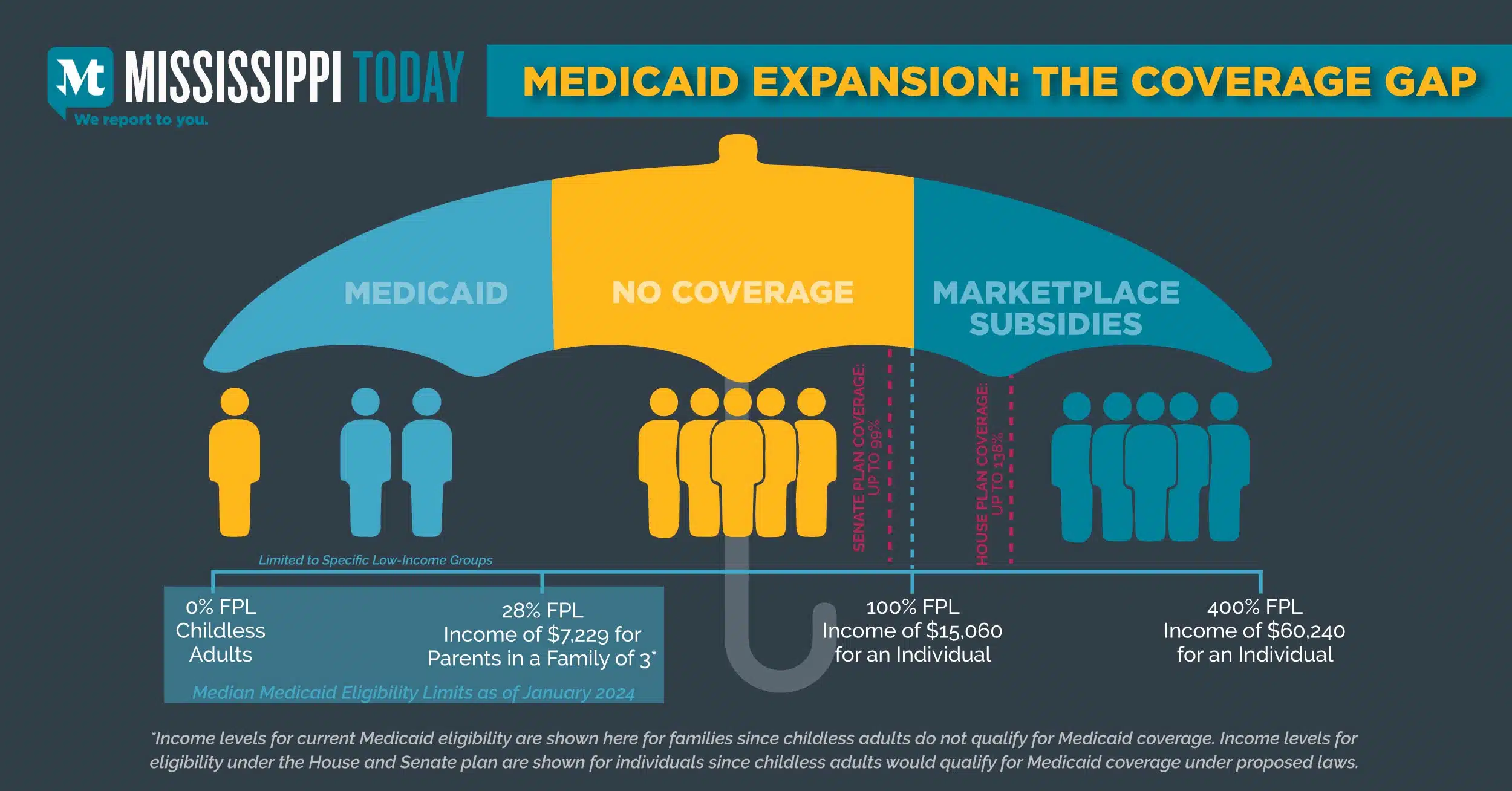Mississippi Today
A coverage gap Catch-22: To work, Selinda Walker needs health care. To get health care, she needs work.

Forty-seven-year-old Selinda Walker had to move back in with her elderly mother after an untreated and severe case of Graves’ disease left her unable to work and live independently.
As a single, low-income individual with no children, Walker has no path toward health care in the state of Mississippi, which remains one of 10 states in the country not to expand Medicaid. And as lawmakers advocate for work requirements in Medicaid expansion bills, Walker faces a Catch-22: she needs health insurance first to get healthy enough to be able to return to work.
The progression of her disease made it impossible for her to continue working at her jobs in retail and car sales. The worst of her symptoms cause her to suffer dizzy spells and temporarily-paralyzing falls throughout the day, among a slew of other problems.
“I feel like I’m a burden to my mother,” Walker, who lives in Columbus, said. “She has to do so much because I can do so little. There are days where I am just useless, the pain is so bad.”

Since she inherited the gene from both her parents, Walker has a textbook case of the autoimmune disease with all of its worst symptoms. The condition, which causes the immune system to mistakenly attack healthy tissue, gets progressively worse if left untreated.
Without health insurance, Walker’s only recourse is a free clinic in Tupelo, about an hour and a half away from where she lives in Columbus. The clinic is able to prescribe her thyroid medications to varying degrees of success, but it’s nothing compared to the quality of life improvement she might experience if she were able to get the proper tests done and potentially undergo a more permanent solution like thyroid surgery.
One of the 10 medications she’s currently on helps treat the insomnia associated with Graves’ disease, but it sometimes causes her to sleep through the day. None of the medications help alleviate her back pain or the gut issues, chills or tremors she lives with.
“It’s very scary to think I don’t have anybody to check me out every month … every day I’m wondering if I’ll wake up,” she mused.
As a childless adult, Walker doesn’t qualify for Medicaid – period. She says the last two times she applied for disability Medicaid, case workers told her they could only help her if she got pregnant.

“I was shocked,” Walker said. “I couldn’t believe what I was hearing. Mississippi is one of the strangest states ever. The only way to help me is if I have children?”
Even if she had children, or if that rule didn’t exist, Walker was at that time making more than 28% of the federal poverty level, a mere $7,000 annually for a family of three – the maximum salary a Mississippi family can make and still qualify for Medicaid – working full-time at her jobs in retail and car sales.
And she’s far from the only one. Anyone making at least minimum wage working full-time makes more than 28% of the federal poverty level, which then counts against them and disqualifies them from Medicaid.
Walker is one of tens of thousands of Mississippians who fall into the “coverage gap.” These individuals don’t qualify for Medicaid under the state’s current restrictions but make less than the 100% of the federal poverty level, about $15,000 a year for an individual, that would qualify them for subsidies that make marketplace insurance affordable.
The coverage gap exists in states that have not expanded Medicaid under the Affordable Care Act, which presumed all states would automatically expand Medicaid. However, a 2012 Supreme Court ruling made expansion optional for states.
New proposals in the Mississippi Legislature would expand Medicaid, as 40 other states have done, covering families and adults with a household income of up to 138% of the federal poverty level, under the House plan, or 99%, under the Senate plan.
Both plans would cover more Mississippians than are currently covered. But under both plans, the threat of a work requirement could leave individuals like Walker behind.
Policing and enforcing the work requirement costs more than it would cost to insure the population of unemployed people who would become eligible for Medicaid under expansion. Experts say developing new administrative systems would burden an already precarious system and could cost up to tens of millions of dollars. What’s more is the paperwork can be confusing to enrollees, causing legitimately employed and income-eligible individuals to be denied coverage.
The House plan would expand Medicaid regardless of whether the federal government approved a special waiver necessary to implement a work requirement. But the Senate plan is entirely contingent on the approval of the work requirement – unlikely to happen under the Biden administration, which has rescinded work requirements previously granted under the Trump administration and not approved new ones.
Dr. Dustin Gentry, a family physician at Winston Medical Center in Louisville, is a self-described Republican who says he can’t abide by his party’s long-standing belief that Medicaid expansion isn’t the most financially responsible decision for Mississippi.
“I want Mississippi to have coverage for uninsured patients in the coverage gap, and I want us to do it in a way that makes most sense financially, which is the House plan,” Gentry said. “It doesn’t make sense for us to not take the (federal) money, when everybody else is taking it. It puts us further behind.”
A plan like the Senate’s would leave $1 billion federal dollars on the table. An expansion plan that doesn’t cover people making up to 138% of the federal poverty level, about $20,000 annually for an individual, isn’t considered “expansion” under the Affordable Care Act, and therefore doesn’t qualify for the increased federal match rate, nor the additional two-year financial incentive the ACA gives to newly-expanded states.
Mississippians are already paying for Medicaid to cover hundreds of thousands of poor, working people – in other states.
“It’s important to note that the residents of Mississippi and the other holdout states have not been spared from paying for Medicaid expansion,” Dr. Joe Thompson, the Arkansas surgeon general under Republican Gov. Mike Huckabee and Democratic Gov. Mike Beebe told Mississippi Today. “They have been helping to fund it for over a decade through their federal tax dollars, but the money has been flowing into states like Arkansas and Louisiana instead of benefiting the working poor, hospitals, and economies of their home states.”
And hospitals are dying because uninsured individuals’ only recourse for medical care is the emergency room – the most expensive place to receive care. One report estimates that nearly half of all Mississippi’s rural hospitals are at risk of closure due to uncompensated care costs hospitals must front to cover these individuals each year.

“Everybody’s got heartburn over people ‘getting something they don’t deserve,’” Gentry said. “But these people get free care anyways. They’re getting it from the emergency room, and it’s uncompensated care, and it’s the most expensive way to get care possible. So they’re getting it for free, we’re just bickering over who is going to pay for it.”
And while emergency rooms cannot turn down individuals who require immediate life-saving care, they do nothing to provide the necessary preventative care to improve the quality of life for people like Walker.
Walker believes if she could get the proper tests and treatment plan, she could go back to work and live independently. But with Gov. Tate Reeves promising to veto any expansion bill and the Senate hung up on a stringer work requirement, the chances Walker will get the care she needs look slim.
The six lawmakers tasked with hammering out a conference report on Medicaid expansion currently have until April 27 to file the bill and until April 29 to adopt it.
This article first appeared on Mississippi Today and is republished here under a Creative Commons license.
Mississippi Today
Mississippi school superintendents indicted on fraud charges
The superintendents for Leake County and Hollandale school districts and a consultant have been indicted on four federal counts of conspiracy to commit embezzlement, theft and bribery.
According to the indictment, Earl Joe Nelson, while superintendent of Clarksdale Municipal School District and now Leake County School District, and Mario D. Willis, as superintendent of Hollandale School District, allegedly paid each other tens of thousands of dollars in school funds for consultant services that were never rendered from November 2021 until at least June 2023.
Additionally, the duo is accused of stealing U.S. Department of Education funds that were intended for their respective districts.
A St. Louis-based consultant and teacher, Moneka M. Smith-Taylor, has also been indicted on bribery charges in connection with the case. She allegedly received more than $250,000 from Willis for consulting services that were never provided over the course of two years.
She returned part of that money to Willis in the form of a cash kickback in return for the consulting contract, the indictment says.
A spokesperson for the Mississippi State Department of Education directed Mississippi Today to local school boards, who make personnel decisions for their respective districts, for comment.
The job status of the two superintendents is unclear. District officials could not be reached by presstime, but Willis is still listed as the superintendent of Hollandale School District and Nelson is still listed as the superintendent of Leake County School District in the state education department’s online directory.
It’s also unclear whether the defendants have a lawyer who could speak on their behalf.
This article first appeared on Mississippi Today and is republished here under a Creative Commons Attribution-NoDerivatives 4.0 International License.
The post Mississippi school superintendents indicted on fraud charges appeared first on mississippitoday.org
Note: The following A.I. based commentary is not part of the original article, reproduced above, but is offered in the hopes that it will promote greater media literacy and critical thinking, by making any potential bias more visible to the reader –Staff Editor.
Political Bias Rating: Centrist
The article reports on the indictment of two Mississippi school superintendents and a consultant on federal fraud charges in a straightforward, factual manner. It presents the legal allegations without editorializing or taking a stance. The language is neutral and focused on relaying verified information from the indictment and official sources, without suggesting guilt or innocence. There is no evident ideological framing or advocacy; rather, the piece sticks to reporting the details of the case and the status of the individuals involved. Thus, the article adheres to objective journalistic standards without discernible political bias.
Mississippi Today
Defendant in auditor’s ‘second largest’ embezzlement case in history goes free
Four years ago, agents from the state auditor’s office arrested Tunica nonprofit operator Mardis Jones in what the office trumpeted as the second-largest embezzlement case in its history and demanded Jones return over $1 million to the state.
The charges accused Jones of stealing $750,000 from a home rehabilitation program he was supposed to be administering while turning away needy rural residents living in crumbling houses.
But his defense attorney attacked holes in the case, and last month, a local jury found Jones not guilty of the criminal charges. Now, the state has made no indication it will bring a civil case to try to claw back the money from him.
Jones’ nonprofit Tunica County Housing Inc. secured a subcontract with the county through the North Delta Regional Housing Authority in 2014 to run the county’s home rehabilitation program funded with casino revenue. For his work, vetting applications and managing expenses, Jones earned $12,000 a month.
At the core of the criminal case were “strange money transfers” and a finding that several of the people whose applications for home rehab were approved allegedly never received any repairs to their homes. According to the auditor’s office, investigators found less than 20% of the nearly $2 million Jones’ nonprofit received went to the contractors working to rehab homes.
“Once again, an arm of government trusted a private organization to run a government program, and a large percentage of the program’s spending was flat out stolen,” State Auditor Shad White said in a press release after the arrest.
Attorney General Lynn Fitch echoed White, saying, “These funds – hundreds of thousands of dollars – were meant to help the elderly, handicapped, and poverty stricken. But the funds never got to the vulnerable citizens who needed it most.”
Jones’ lawyer Carlos Tanner explained to Mississippi Today that the program operated with an extreme backlog, and that “some of the people they were claiming didn’t get their houses done actually did” by the time the trial was held this year.
The program was poorly administered, Tanner said, meaning that even if a person’s application was approved and a rehab contract prepared, county officials could direct Jones to put someone else’s repair job ahead of his or hers.
“But just because it was run like a first weekend lemonade stand does not mean Mardis Jones stole money,” Tanner said.
Tanner said the investigators gathered paltry evidence, only looking at details that fit their narrative. While Jones did earn a large salary through his contract, Tanner said prosecutors never presented evidence that Jones converted money that was supposed to be used on home rehabilitation to his personal use.
Investigators got a warrant to seize Jones’ electronics, Tanner said, but “they never bothered to search it.”
“The two OSA (Office of the State Auditor) officials who were running the investigation, I questioned them about it during trial, and neither of them could tell me where the computer was, where the phone was, or what the contents were,” Tanner said.
Jacob Walters, a spokesperson for the auditor’s office, defended the way the investigators handled the case, saying, “The state auditor’s office is never going to turn a case we investigated over to a prosecutor unless we’re fully confident in the work that we did.”
At the time the auditor’s office announced the Jones arrest, it also said it delivered a demand letter ordering Jones to repay over $1 million, the money it alleged he stole plus interest and investigative expenses.
It’s up to the attorney general or local district attorney to decide how to prosecute auditor investigations, or in Jones’ case, what happens to the civil demand now that a jury found him not guilty in the criminal case.
When a person receives a demand alongside his or her arrest, regardless of what happens with criminal charges, the claw back can be enforced through civil litigation — much like the case against several defendants in a stunning Mississippi Department of Human Services fraud case, which began in 2020 and has yet to be resolved. Walters said the demand against Jones is still the office’s next-largest in history, second only to the welfare scandal.
The government might choose to pursue civil litigation, even if criminal prosecution is unsuccessful, because there is a lower burden of proof to win civil cases.
But the attorney general’s office told Mississippi Today last month that it had not received the Jones demand letter from the auditor, meaning it has nothing left to enforce.
Walters said the auditor’s office sent the letter along with the case file four years ago, but that with a turnover in attorneys prosecuting the case, the auditor had to resend the file last year. If the attorney general’s office no longer possesses the demand document, Walters said, “it’s an incredibly easy problem to resolve.”
“Just reach out to us with a single phone call or email and we can get it to you,” Walters said.
After the interview, the auditor’s office sent the demand letter by email, and the attorney general’s office confirmed it was received.
This article first appeared on Mississippi Today and is republished here under a Creative Commons Attribution-NoDerivatives 4.0 International License.
The post Defendant in auditor’s ‘second largest’ embezzlement case in history goes free appeared first on mississippitoday.org
Note: The following A.I. based commentary is not part of the original article, reproduced above, but is offered in the hopes that it will promote greater media literacy and critical thinking, by making any potential bias more visible to the reader –Staff Editor.
Political Bias Rating: Centrist
This article presents a factual and balanced account of the embezzlement case involving Mardis Jones without overt ideological framing. It reports statements from both government officials criticizing the alleged misconduct and the defense attorney’s rebuttals, highlighting weaknesses in the prosecution’s case. The tone remains neutral, avoiding partisan language or loaded terms. It focuses on the procedural aspects, jury verdict, and potential civil actions without advocating for a political viewpoint. The article provides context from multiple perspectives, adhering to objective reporting rather than promoting a specific ideological stance.
Mississippi Today
JPD called ICE on Miss. father, who faces deportation
Kerlin Moreno-Orellana is facing deportation over a misdemeanor charge that usually results in a fine. He was picked up by Immigration and Custom Enforcement agents on Thursday morning and transferred from the Raymond Detention Center to an ICE detention center in Louisiana.
On June 16, Jackson police arrested Moreno-Orellana, a contractor, in south Jackson along with his employer Christy Parker, who was showing him one of the old properties she worked on. Both were charged with illegal dumping, but Parker claims they did not dump anything.
After detaining them, Jackson police called a local TV outlet, 16 WAPT News, to come shoot the scene of the arrest. Parker said they were kept in the police car for over an hour, waiting for the news crew. The WAPT newsroom explained that the Jackson police routinely asks them to cover arrests related to illegal dumping or other high profile cases, in order to “dissuade people.”
Once at the station, the Jackson Police Department called ICE on the 35-year-old father of four, who had worker authorization documents. He was kept in jail overnight, while Parker was released hours after their arrest.
“He didn’t do anything I didn’t do,” Parker said in an interview with Mississippi Today. “But because I’m white, I’m here?”
A municipal court ordered Moreno-Orellana’s release the day after, but ICE placed a detainer on him – a formal request to keep a non-citizen in custody for 48 hours, while the agency investigates. It is not an arrest warrant. However, a state law passed in 2016 mandates that all local law enforcement comply with ICE detainers placed on undocumented immigrants.
“What we are doing today is no different than what we’ve always operated when the detainer is sent by ICE to the jail,” said Hinds County Sheriff Tyree Jones. “Nothing has changed.”
While the Hinds County Sheriff’s Department has historically worked with ICE, Jackson police actively seeking out ICE to detain people is a fairly recent occurrence, said Mississippi-based immigration attorney Jeremy Litton. Jackson police did not respond to a request for comment.
ICE picked up Moreno-Orellana with hours left on his detainer, and he now faces deportation. ICE spokesperson Lindsay Williams said that Moreno-Orellana violated the conditions of a past bond agreement by being arrested for a new charge. He had already spent over a month in ICE custody in 2019, after getting arrested by park rangers for speeding and driving without a license.
Still, a minor misdemeanor charge – like illegal dumping – is normally insufficient for ICE to threaten to deport someone with worker authorization paperwork. Removal of a person with documentation is usually justified if the person is deemed a threat to public safety or national security.
“This does feel like a result of the elevated focus on deporting people from the Trump administration,” said Matt Steffey, professor at the Mississippi College School of Law.
Moreno-Orellana, who is from Honduras, has three boys and a girl, the youngest of whom is less than a year old. He has lived in Mississippi for over 16 years. Colleagues describe him as a valuable worker and a good friend.
“All he ever did was work and go home,” Parker said. “He was always willing to give somebody help.”
The possibility of his deportation is leaving his family in a precarious situation. Moreno-Orellana was the sole breadwinner of the family, and his wife worries about sustaining herself and their children without him.
“I’ve always dedicated myself to taking care of my kids at home, and he’s the one who brings food to the table,” his wife said in Spanish. “I’m afraid of staying, being without my children’s father. Not so much for me, but because they need him.”
This article first appeared on Mississippi Today and is republished here under a Creative Commons Attribution-NoDerivatives 4.0 International License.
The post JPD called ICE on Miss. father, who faces deportation appeared first on mississippitoday.org
Note: The following A.I. based commentary is not part of the original article, reproduced above, but is offered in the hopes that it will promote greater media literacy and critical thinking, by making any potential bias more visible to the reader –Staff Editor.
Political Bias Rating: Center-Left
This article primarily reports on the actions of law enforcement and ICE with a focus on the human impact of deportation on a Mississippi family. While the reporting remains factual, the framing and choice of quotes highlight concerns about racial disparities, immigration enforcement policies, and potential overreach by authorities, suggesting a subtle critical tone toward current immigration enforcement practices. The article’s emphasis on the family’s hardship and the legal nuances involved positions it slightly left-of-center, sympathetic to immigrant rights and critical of aggressive ICE actions. However, it avoids overt ideological language, maintaining largely balanced coverage.
-
News from the South - Tennessee News Feed6 days ago
Thieves take thousands of dollars in equipment from Union County Soccer League
-
Mississippi Today4 days ago
Defendant in auditor’s ‘second largest’ embezzlement case in history goes free
-
News from the South - Texas News Feed6 days ago
Robert Nichols to retire from Texas Senate
-
News from the South - Louisiana News Feed6 days ago
3 lawsuits filed against CVS, Louisiana AG announces
-
News from the South - Missouri News Feed6 days ago
Residents provide feedback in Kearney Street Corridor redevelopment meeting
-
News from the South - Alabama News Feed6 days ago
News 5 NOW at 12:30pm | June 24, 2025
-
The Conversation6 days ago
The Vera C. Rubin Observatory will help astronomers investigate dark matter, continuing the legacy of its pioneering namesake
-
News from the South - Florida News Feed6 days ago
DeSantis signs bill into law that ensures public access to Florida beaches | Florida

















































